Best laptop for video conference and Zoom meetings in 2025
These laptops boast a high-end webcam and mic combo required for video conferencing and meetings.

Attending Zoom meetings has become a standard part of everyday life in the last few years, and whether you need to participate in online classes or collaborate with your co-workers, having a device that can keep up is essential.
Whether it's Zoom or any other video conferencing app, you need a laptop with a quality webcam, microphones, speakers, and display, with solid battery life to boot.
I've taken these features into consideration, looking at more than 30 recent laptop reviews totalling hundreds of hours of time testing hardware. I've included only quality Windows laptops that we've personally used and tested. The Surface Laptop 7 is my top pick, but there are more options to consider.
Recent updates
March 27, 2025: I replaced the HP Spectre x360 with the new OmniBook Ultra Flip, and I also added some new honorable mentions. — Cale Hunt
The quick list
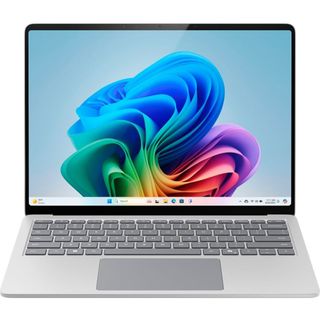
Best overall
The Surface Laptop 7 is one of the best Copilot+ PCs with access to all Windows AI tools. It has a quality webcam, excellent speakers, and its Qualcomm Snapdragon X hardware affords long battery life and stellar performance.
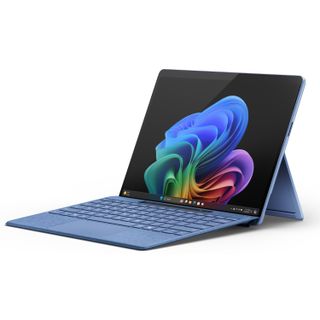
Best 2-in-1
The versatile 2-in-1 Surface Pro 11 is the right choice for users who enjoy a tablet as much as a notebook. It's a Copilot+ PC powered by Qualcomm Snapdragon X chips, and it has an impressive 12MP front-facing webcam, optional OLED touch display, and quality speakers.
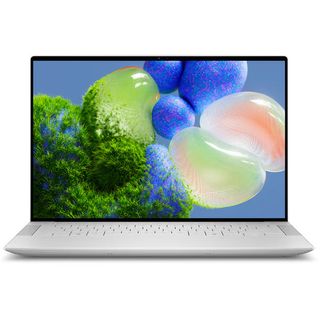
Best 14-inch
Dell's XPS 14 (9440) is a premium pick with a unique design, high-performance hardware, and the right tools for a quality Zoom meeting. Take advantage of a 1080p webcam with IR, quad speakers with Dolby Atmos, and dual-array microphones, with up to a 3.2K OLED touchscreen to display everything.
Load the next products ↴
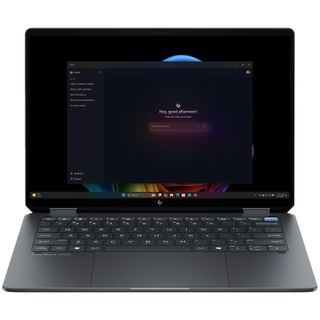
Best convertible
The OmniBook Ultra Flip 14 succeeds the excellent Spectre x360, featuring a 9MP webcam with plenty of color and detail. Quad speakers, OLED touch display, and a slick convertible design are other top selling points.
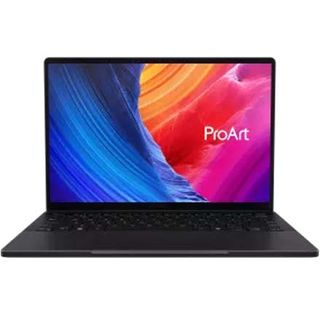
Best for creators
One of our favorite laptops for creators, the ProArt PX13 is a versatile convertible with tons of power thanks to an optional NVIDIA RTX 4060 Laptop GPU. The 2.8K OLED touchscreen is gorgeous, and you get a 1080p camera with IR, dual-array mics, and stereo speakers.

As the head of Windows Central's reviews, Daniel Rubino has tested hundreds of laptops since 2015. If you want to know which laptops are the best on the market, even for niche uses like Zoom meetings, he's the one to ask.

I've been testing and reviewing laptops professionally for more than 8 years, with hundreds of reviews written for Windows Central. I know what makes a good laptop for video conferencing, and I've taken into consideration camera, display, and speaker quality to arrive at these picks.
My favorite laptops for video conferencing and Zoom meetings in 2025
Why you can trust Windows Central
Best overall laptop for video conferencing
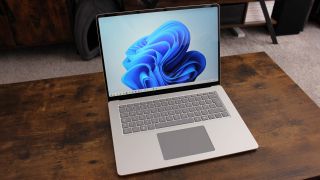
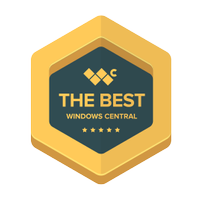
Specifications
Reasons to buy
Reasons to avoid
The Surface Laptop 7 is an easy top pick even if you aren't focusing on video conferencing features. It's the latest notebook PC from Microsoft's premium Surface series, and it was one of the first Copilot+ PCs to be announced with Qualcomm's Snapdragon X Systems-on-Chip (SoC).
Windows Central Senior Editor Zac Bowden reviewed the Surface Laptop 7, giving it a Best Award and ultimately coming to the conclusion that it's the best clamshell laptop on the market thanks to its awesome ARM64 performance, long battery life, and svelte design. On the topic of hardware needed for video calls, Bowden said:
"Surface has always had a great webcam and microphone, and the same holds true here on the new Surface Laptop 7. Starting with the webcam, we've got a 1080p shooter that looks crisp and clear, with no visible artifacts or noise in normal lighting conditions. [...] The microphones are just as good, utilizing Microsoft's "Studio Mics" in a dual-setup configuration which are clear and very audible, even at a distance. You should be able to attend meetings with these microphones with no problems at all."
Speakers installed beneath the keyboard provide loud and clear sound without any visible grilles, and Dolby Atmos tuning is included for further improvements to sound quality.
Microsoft offers both 13.8- and 15-inch models depending on your preferences, with the major difference being that the smaller laptop has an optional Snapdragon X Plus alongside the usual X Elite SoC. Of course, the display resolution differs between sizes, though both come out to the same 201 pixels per inch. Both displays have a smooth 120Hz refresh rate with Dolby Vision support.
If you're interested in trying out Windows on ARM with the full host of Copilot+ AI tools powered by Qualcomm's 45 TOPS Neural Processing Unit (NPU), the Surface Laptop 7 should be your first consideration.
👀 Read our full Surface Laptop 7 review
🔎Further analysis: Surface Laptop 7 vs. MacBook Air M3
Best 2-in-1 laptop for video conferencing
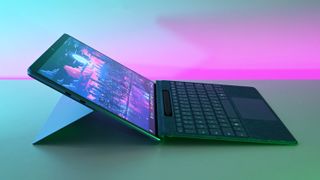

Specifications
Reasons to buy
Reasons to avoid
The Surface Pro 11 was revealed alongside the Surface Laptop 7 as one of the first Copilot+ PCs. Unlike the Laptop 7, the Pro 11 is a 2-in-1 device with a removable keyboard/touchpad and a built-in stand. It's a sleek 13-inch tablet available with an OLED touch display at a 2880x1920 resolution, with Dolby Vision support, inking capabilities, 120Hz refresh rate, and up to 900 nits brightness with HDR enabled.
When you attach a keyboard and touchpad, it turns into a notebook PC. The latest hardware is the Pro Flex keyboard, featuring a haptic touchpad, wireless connectivity (allowing you to use it in your lap without being physically attached to the PC), and a more rigid base.
The Pro 11 is powered by Qualcomm's Snapdragon X Elite and X Plus SoCs, complete with 45 TOPS NPU for Copilot+ AI tools in Windows. It's now even available with optional 5G connectivity for those who can't always rely on Wi-Fi 7.
Windows Central Editor-in-Chief Daniel Rubino gave out a Best Award in his Surface Pro 11 review, remarking on the subject of video and audio hardware:
"Microsoft pulls no punches with the front-facing camera on the Surface Pro 11 as it packs one of the largest, by megapixel count, cameras I have seen on any laptop at 12.2MP (4:3, 4032x3024). [...] Combined with the previously mentioned AI tools from Windows Studio Effects, you can easily get the best webcam performance on any laptop today with auto-framing, two levels of background blur, gaze correction, and various filters. The colors were punchy and warm, and the sharpness was exquisite."
It would be nice to have a privacy shutter and some human presence detection (HPD), but at least there's an IR sensor for biometric security. On the subject of audio, Rubino said:
"Not much has changed for audio on Surface Pro, which is good. Microsoft has always had some of the best audio of any Windows PC, which continues with Surface Pro despite its diminutive size. Flanking front-facing, barely visible speakers pump out rich and punchy audio, bolstered by Dolby Atmos for the speakers (and headphones)."
This should be a top choice if you're shopping for an AI PC with Copilot+ capabilities in a versatile 2-in-1 form factor.
👀 Read our full Surface Pro 11 review
Best 14-inch laptop for video conferencing
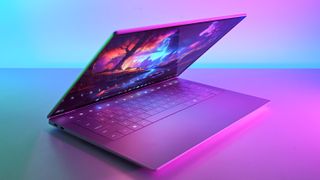

Specifications
Reasons to buy
Reasons to avoid
The XPS 14 (9440) is a laptop that wants to do it all. It includes a lattice-free keyboard (meaning there's no space between keycaps), the haptic touchpad is hidden beneath the glass palm rests, and the function buttons along the top are capacitive touch. This futuristic design might take some getting used to, but everyone I know who's used one has come around quickly to the slick layout.
Some big news for fans of the XPS line was a move to a 1080p webcam for the 9440 model. It has an IR sensor for facial recognition, and HPD is available. Editor-in-Chief Daniel Rubino reviewed the XPS 14 (9440), stating:
"I've used a lot of laptop cameras over the last ten years, and this Dell XPS 14 is one of the best I've used. Images are sharp, color balance is good, image noise is reduced, and Windows Studio Effects (background blur, eye gaze correction, auto-tracking) is the smoothest I've ever seen, which is all due to that NPU."
He is referring to the NPU in the laptop's Intel Core Ultra processors; Dell offers up to a Core Ultra 7 155H with 32GB of LPDDR5x RAM, 1TB M.2 PCIe 4.0 NVMe SSD, and an NVIDIA RTX 4050 Laptop GPU. This isn't a Copilot+ PC due to the NPU not breaching 40 TOPS, but it is one of our favorite AI laptops.
Rubino goes on to state, regarding the XPS 14's audio:
"The quad-speaker array is also outstanding if you choose the proper sound profile, e.g., movie, for your task. The spatial separation, sharpness, and volume are above average, delivering a delightful multi-media experience."
The XPS 14's 14.5-inch display completes the premium trifecta of video conferencing needs. More affordable models start at an FHD+ resolution, but I urge anyone with the extra budget to go with an OLED panel. It has a 3200x2000 resolution, a 120Hz variable refresh rate, up to 500 nits brightness with HDR enabled, 100% DCI-P3 color, and touch functionality.
Note that Dell is in the midst of rebranding its portfolio of laptops, and this will likely be the last XPS laptop (barring a revival sometime in the future). The new Dell laptops are expected to launch in Q1 2025.
👀 Read our full Dell XPS 14 (9440) review
🔎Further analysis: Dell XPS 14 (9440) vs. HP Spectre x360 14 (2024)
Best convertible laptop for video conferencing
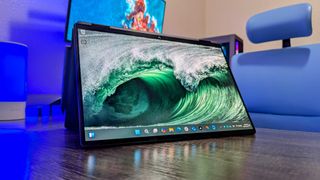
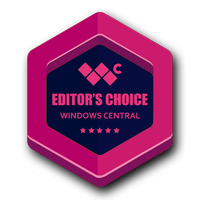
Specifications
Reasons to buy
Reasons to avoid
HP's OmniBook Ultra Flip 14 is the successor to the legendary Spectre x360 lineup, offering a similar premium convertible experience for those who enjoy splitting time between notebook and convertible.
It has few blind spots, with strong Intel Core Ultra (Series 2) performance (and an NPU for AI tasks), best-in-class keyboard and haptic touchpad, and a design that's thinner and lighter than its predecessor.
The excellence extends to the audio and camera hardware on board. Windows Central laptop aficionado Zachary Boddy reviewed the OmniBook Ultra Flip 14, stating:
"The [laptop] boasts a 9MP front-facing camera — much higher than the standard 5MP most of the other best laptops have — flanked by dual-array digital microphones. It's a potent pairing backed by HP's Poly Camera Pro software suite; this camera still struggles in poor lighting conditions and can quickly introduce a ton of noise, but it's detailed, colorful, and well-balanced."
Quad speakers make a return, and though they're now all located on the bottom of the PC, they provide awesome sound thanks to Poly Studio and DTS:X Ultra tuning.
👀 Read our full HP OmniBook Ultra Flip 14 (2024) review
Best creator laptop for video conferencing
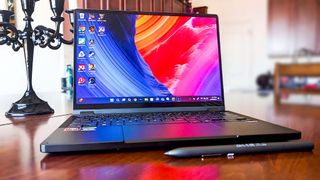

Specifications
Reasons to buy
Reasons to avoid
The ASUS ProArt PX13, thanks to its AMD Ryzen AI 300 CPUs, is expected to get access to Copilot+ AI tools in Windows in November. If you're a creator who'd like to try out the new features like Windows Recall, Live Captions, Cocreator, and more on an x86-64 system, this is a great option.
Beyond the upcoming Copilot+ AI tools, the ProArt PX13 is simply a high-end 13-inch convertible with the right hardware to handle more demanding workflows. It packs an AMD Ryzen AI 9 HX 370 CPU, up to an NVIDIA RTX 4060 Laptop GPU, 32GB of LPDDR5x RAM, and a 1TB M.2 PCIe 4.0 NVMe SSD. These specs are more impressive when you consider the laptop measures just 0.62 inches thin.
Windows Central Editor Rebecca Spear reviewed the ProArt PX13, remarking on the subject of video and audio hardware:
"When it comes to microphone quality and camera quality, the ProArt PX13 is more than capable of representing you well during virtual video calls. Colors come through accurately and there are plenty of crisp detail from the FHD camera. Meanwhile, my voice carries clearly, and there aren't any strange artifacts accompanying it during meetings."
Add a 13-inch OLED touch display with a 2800x1800 resolution, HDR support, 60Hz refresh rate, and inking capabilities, and you have one well-rounded creator laptop with the added benefit of being able to transform into a tablet. The only real drawbacks are noisy fans under load and abbreviated battery life, both expected outcomes of a thin laptop with so much power.
And if you're a left-handed user, you should be aware of the ASUS dial located in the left corner of the touchpad. It's super useful for creative work, but it gets in the way if you're not right-handed.
👀 Read our full ASUS ProArt PX13 review
Honorable mentions
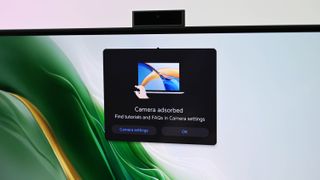
The five laptops listed above are the best of the best for video conferencing and Zoom meetings, but I couldn't not mention these other laptops that we've reviewed or otherwise tested.
- HONOR MagicBook Art 14: This tremendous Intel-based laptop is thin and light with thin bezels. It has a 2.1MP webcam that's removable, allowing you to flip it around and use it for presentations or collaboration. When finished, the camera tucks away into a storage slot. 👉 Read our Honor MagicBook Art 14 hands-on
- ASUS Zenbook Duo (2025): The Zenbook Duo's webcam isn't particularly impressive at 1080p, but the overall dual-screen setup allows you to host a video conference on one display while retaining a 14-inch display for other work. 👉 Read our ASUS Zenbook Duo review
- HP EliteBook 1040 G11: Those searching for a business laptop should check out HP's model, complete with a 5MP IR webcam, quad stereo speakers, tons of security, and strong performance. 👉 See the EliteBook 1040 G11 at HP
- Acer Aspire Go 14: At about $300, this budget laptop's 720p webcam doesn't look so bad. It has amazing battery life, strong AMD Ryzen performance, and lots of ports. 👉 Read our Acer Aspire Go 14 review
How we test laptops for video conference and Zoom meetings
Every laptop that comes our way for review at Windows Central undergoes a similar bout of testing.
We use a colorimeter to test the display's color accuracy and brightness, a FLIR camera to test thermal management, and a decibel meter to test fan and overall system noise.
It's then on to synthetic benchmarking software, including top tests from Geekbench, Cinebench, PCMark, 3DMark, CrossMark, CrystalDiskMark, and more. For battery life, we use a mix of real-world experience, battery report averages, and specific battery benchmarks.
👉 How we test and review laptops at Windows Central
Because we essentially "adopt" a laptop for regular use while it's in the review process, we can get a good idea of how well the PC delivers on its hardware promises for features like camera and speakers.
That's especially important in this instance. We use a laptop's webcam for our frequent video conferences, asking for opinions on quality. Local picture quality for stills and video is also taken into account.
If a laptop's webcam or speakers are lacking, you can be sure you'll hear it about it in our reviews.
How to choose the best laptop for video conference
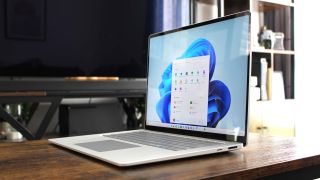

Finding the right laptop to handle daily or even weekly Zoom meetings is extra important these days as many people continue working from home. It really doesn't matter if you're using Zoom or any of the other video conferencing apps — like Microsoft Teams and Google Meet — as your laptop needs the same quality webcam, speakers, microphones, and display.
You also need to take into account the laptop's performance abilities, portability, battery life, and overall design. For example, not everyone needs to pay for the extra engineering that goes into a convertible device, while others will gladly hand over the money in order to secure 360-degree hinges and inking abilities.
With all that in mind, my two top picks are Copilot+ PCs with Qualcomm Snapdragon X chips. Surface devices have traditionally offered quality cameras and speakers, and that's no different with the Surface Laptop 7 and Surface Pro 11. With the updated performance and impressive battery life from the Snapdragon X ARM64 platform, these laptops are better than ever.
The Surface Laptop 7 starts at about $1,200 for the 13.8-inch model, climbing to about $1,500 for the 15-inch model. However, the PC is often on sale for hundreds less. The Surface Pro 11 starts at a lower $1,000 price, but you have to factor in the added cost of a Surface Pro keyboard. Official hardware can run you anywhere from about $180 up to about $350 for the new Pro Flex wireless keyboard. Like the Laptop 7, the Pro 11 is often discounted.
If you don't want to use Windows on ARM, I suggest checking out the Dell XPS 14 (9440), HP OmniBook Ultra Flip 14 (2024), ASUS Zenbook Duo (2025), or HONOR MagicBook Art 14 (if you can find it). They're all some of the best laptops we've used this year, and they have the right hardware to deliver a top-notch video conferencing experience.
Best laptops for video conference and Zoom meetings: FAQ
I've included some of the most frequently asked questions in regard to laptops and video conferencing or Zoom meetings.
What laptop specs do I need for video conferencing?
The beauty of video conferencing software is that it doesn't take a powerhouse PC to run.
For example, Zoom only requires 4GB of RAM and a dual-core CPU with a 2GHz frequency; these specs are surpassed in the vast majority of even semi-modern laptops.
Of course, buying a faster laptop means there's far less chance you'll experience issues while video conferencing.
Zoom actually recommends having at least 16GB of RAM for smooth operation, and I recommend the same if you're frequently involved in video meetings.
All of the laptops I've included in this list can and will deliver a smooth video conferencing experience — from performance to battery life to camera quality — so no worries on that front.
What Wi-Fi speed is required for video conferencing?
The laptops I've featured here all have modern wireless networking abilities. Wi-Fi 7 is the latest standard, but Wi-Fi 6E and Wi-Fi 6 are still available in plenty of laptops and won't pose a problem for video conferencing.
Even older Wi-Fi standards will work fine as long as your ISP plan is up to snuff. On that note, Zoom recommends having at least a 3.8Mbps download speed and 3.0Mbps upload speed if you want 1080p quality in a group setting.
The laptops will all easily handle the wireless traffic from video conferencing, so as long as your internet plan is good enough (and there's a quality router to direct traffic), you shouldn't have any issues.
Get the Windows Central Newsletter
All the latest news, reviews, and guides for Windows and Xbox diehards.

Cale Hunt brings to Windows Central more than eight years of experience writing about laptops, PCs, accessories, games, and beyond. If it runs Windows or in some way complements the hardware, there’s a good chance he knows about it, has written about it, or is already busy testing it.
- Daniel RubinoEditor-in-chief
- Richard DevineManaging Editor - Tech, Reviews
- Ben WilsonSenior Editor